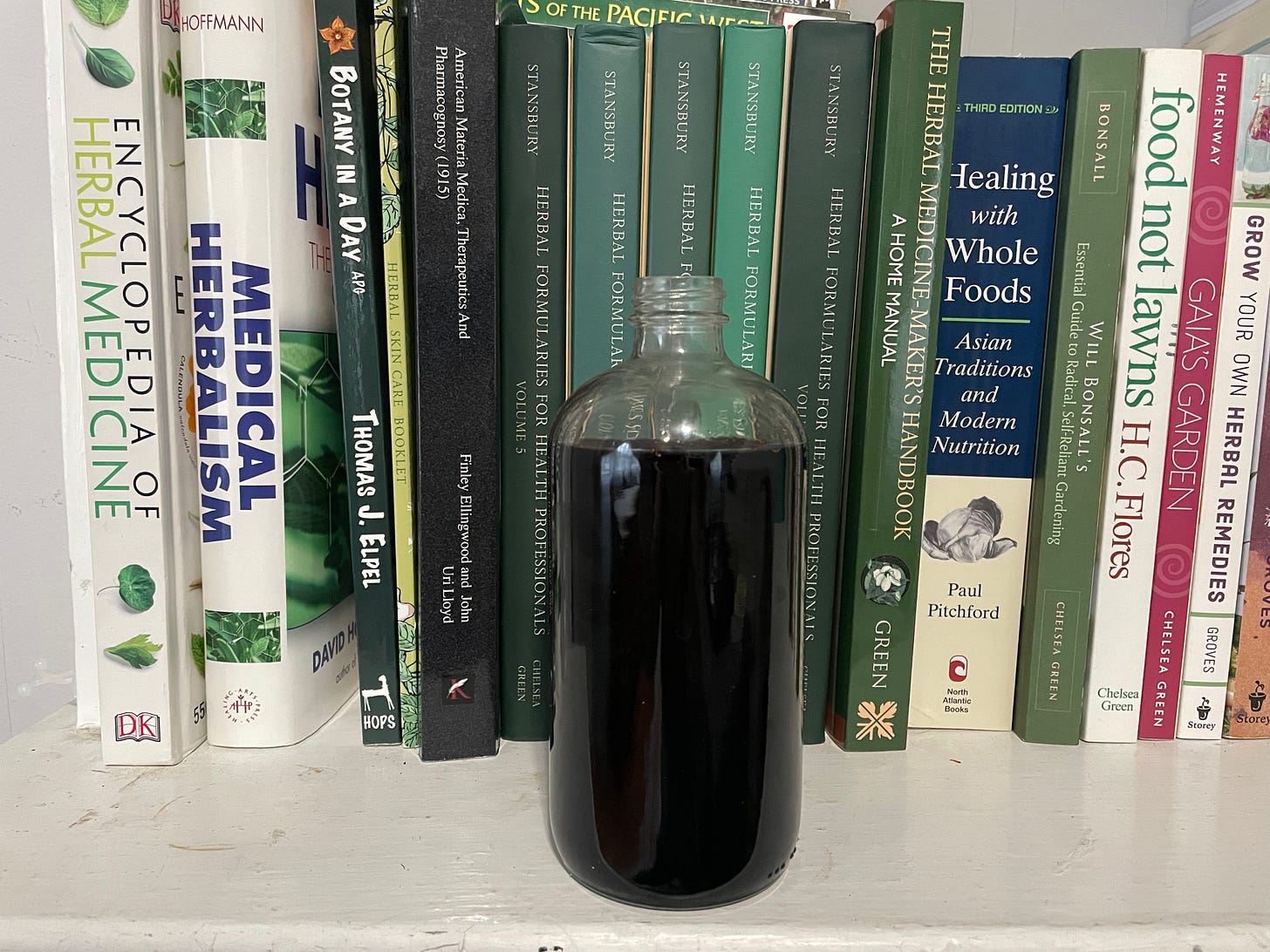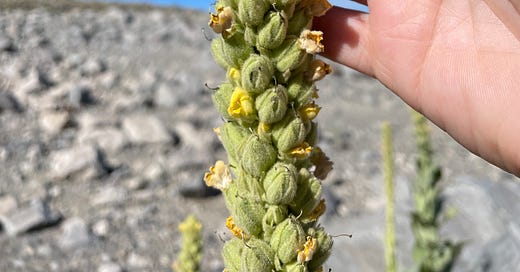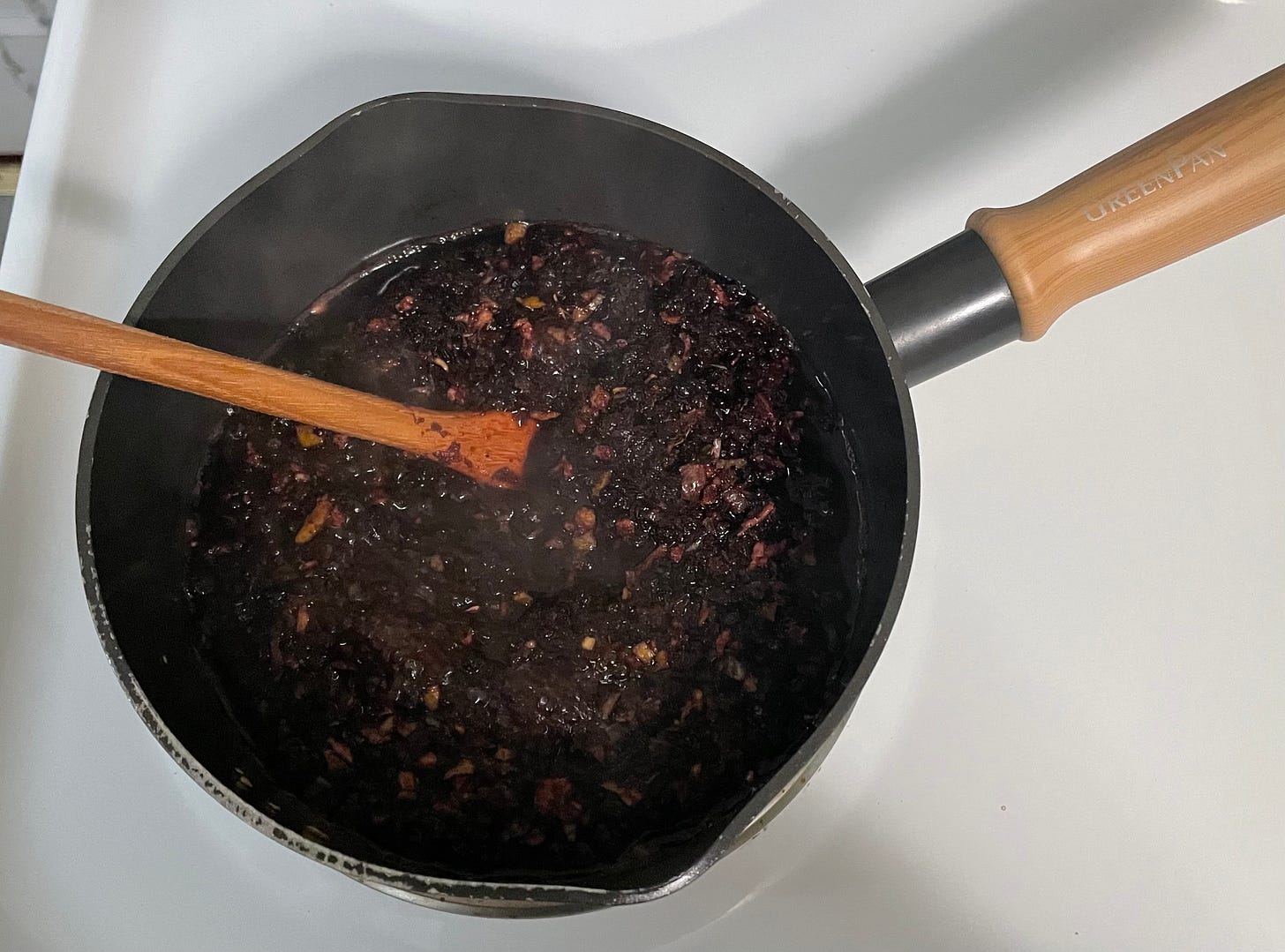Mullein & Elderberry Oxymel
Hello dear readers! I hope you’re squeezing in as much outside time as you can! (As long as it’s not too hot where you live!) We’ve been eating dinner in the yard when it’s nice outside, hitting up farmer’s markets, hiking, and we have a few camping trips coming up! I’m really hoping the weather stays pleasant for quite a while! We’re about to start a living room renovation, which means all the furniture from the living room will be in the kitchen or my bedroom. So, I’m very much hoping we can eat dinner outside for the next few weeks! I’ve been packing up the living room and it’s beginning to look very bare! I haven’t been able to bring myself to pack up my herbals yet though. They are still on the bookshelf! I realized recently that there are at least 3 shelves of those books that I refer to on an almost daily basis. Do you think all of them will fit on my nightstand until the renovation is finished? Perhaps I should just choose the top 10 and pack the rest up for a few weeks?
As the weather begins to change for those of us in the Northeast especially, I’ve been thinking about herbs to support our immune systems and lungs as we move into cooler temperatures, as well as cold and flu season. Many of us immediately think about elderberry syrup! It is a classic remedy that lends support during this time. You can find my recipe for it here. I will most definitely be making a big batch of it very soon. Today I wanted to use elderberries as well, but I wanted to switch it up a little bit. One of my favorite herbal preparations is the oxymel. An oxymel is a basic vinegar and honey remedy that can be used in a variety of ways. I love oxymels and I find them to be very pleasing for even the most picky of palates.
I’ve shared with you previously how much I love elderberry and how beneficial it is! I know I’ve talked a lot about thyme as well. Isn’t it the sweetest little culinary herb? I adore it. Mullein (Verbascum thapsus) is also featured in this recipe. It’s so soft and the flowers are so tiny and beautiful. The leaf and flower are most often used, although the root can be used in some preparations as well. For this recipe, we’ll use the leaf and flower. The leaf has anti-inflammatory properties, and it is also an antispasmodic, a demulcent, and an expectorant, while the flower is also emollient and mucilaginous. Mullein is fantastic for the lungs, especially if there is a deep cough, and is one of those herbs that is very nourishing for those living in fire prone areas. Something else to love about mullein is that it is a quiet nervine. It’s definitely not one that we think of right away when we think about nervines…we usually think of mint family plants first, right? But in regard to the nervous system, mullein is known to soften that which has turned hard, and it can bring about a sense of calm. Most likely you’ve seen it, perhaps not growing in a garden, but on the side of the road or in disturbed fields. If I had space for it, I would plant a huge patch of it! I love to think about plant signatures and when I work with mullein, it’s not just the softness of the leaves that draw me to it, but also that tall, grounded column. Mullein flowers especially help us if we are feeling like we have too much on our plates and aren’t able to focus on one thing at a time. That being said, I hope you love this recipe and I hope it’s something you can turn to when you’re needing support for your respiratory, immune, or nervous system.
Here’s how to make a Mullein and Elderberry Oxymel:
Ingredients
½ cup elderberries. (I have dried on hand so that’s what I used, but they are in season right now so use fresh if you’re able to!)
½ cup mullein leaf/flower
¼ cup orange peel (you can use fresh or dried.)
A few sprigs of fresh thyme or a generous spoonful of dried thyme
2 cups Apple Cider Vinegar
At least 1 cup of honey
Instructions
Place the herbs and apple cider vinegar in a saucepan and bring to a boil, stirring from time to time. (Just a note-apple cider vinegar steam is rather intense-please be cautious!) When it begins to boil, reduce to low heat, cover, and allow it to simmer for at least 30 minutes. You want the liquid to reduce by half. Strain the liquid through a fine strainer lined with cheesecloth and compost the herbs. Mullein has tiny little hairs on the leaves that can be irritating to the throat if not strained well. While the liquid is still warm, add the honey and stir until it has melted into the liquid. Taste and add more honey if you’d like it to be sweeter! Bottle, label, and date. This will keep for at least 6 months (if it lasts that long in your home!) or you can store it in the fridge for a longer shelf life.
How to use an oxymel, you ask? You can take sips of it, up to several times a day if you’re feeling like you need the extra support. You can add it by the teaspoonful to warm water. And it’s also fun to add to bubbly water and sip on a hot day! I’ve even used oxymels as salad dressing!

If you make this recipe, please let me know! I would love to hear from you! I hope the full moon coming up later this week is a time of reflection and I hope it brings a sense of clarity in your life. Lately when I’ve been feeling a little anxious, I’ve turned to gratitude, sometimes even focusing on just 3 things I am grateful for in that moment. I hope you’re able to do the same. Please take good care. And thank you so much for being here.
If you’re enjoying this content and would like to read more, please consider a monthly or yearly subscription! I’d love to have you join me on a weekly basis!
*This is for educational purposes only and has not been evaluated by the FDA. This is not intended to diagnose, treat, prescribe, or cure.






